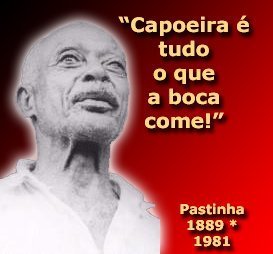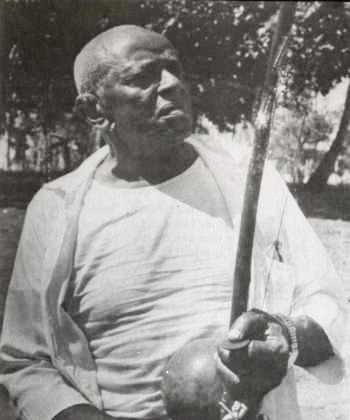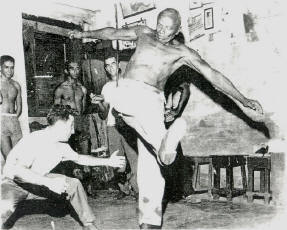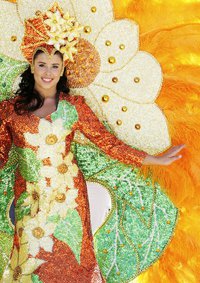Mestre Pastinha
‘Vincente Ferreira Pastinha’
(April 5th 1889 – November 13th 1981)
Mestre Pastinha played capoeira for more than eighty years. His father was a Spaniard, his mother an African. He was taught capoeira by an African from Angola, Mestre Benidito.
Benidito had seen the ten year old Pastinha, who was a very small boy being beaten by a stronger boy. Afterwards, he told Pastinha that if he came to his house he would be taught something very valuable. Benidito was of course talking about Capoeira Angola or n`golo as he called it. Pastinha was a brilliant capoeirista whose game was characterized by agility, quickness and intelligence. Pastinha was the great traditionalist. Pastinha wanted his students to understand the practice, philosophy and tradition of pure Capoeira Angola.
It is said that in the early days of Capoeira, Capoeira was called many things including:
Brincadeira de Angola
Vadiacâo
Jôgo de Angola
Malandragem
Capoeira Angola
Mestre Pastinha once said:
I practice the true Capoeira Angola and in my school they learn to be sincere and just. That is the Angola law. I inherited it from my grandfather. It is the law of loyalty. The Capoeira that I learnt, I did not change it in my school … When my students go on, they go on to know about everything. They know: this is fight, this is cunning. We must be calm. It is not an offensive fight. Capoeira waits… The good Capoeira needs to be able to cry at the foot of the aggressor, he is crying but his eyes and spirit is active. Capoeiristas do not like to be grabbed, he does not like to turn the corner with his chest open. The good capoeirista must know how to sing, play Capoeira and instruments of Capoeira.
He was a composer who wrote many Capoeira songs. He also loved to talk and philosophise about Capoeira:
Capoeira is at a time a dance and a religion.
Capoeira is the special magic (mandinga) of slaves in there longing for freedom. Its’ essence/origins/philosophy doesn’t have methods, its end is inconceivable to the more knowledgable capoeirista.
…The code of honour is indispensable …. To be obeyed by the capoeiristas, therefore…. ” It is the control of the game “… for the judge… for the rules… regulations… and for the rhythm of the orchestra… ” That it prevents the violence and the accidents “…
Mestre Pastinha is without a doubt the most famous of all the Capoeira Angola Mestres but please let us not forget the other great Angoleiros of that time. For at that time to go to a Capoeira Angola School or academy was unheard of. One would pick out a “teacher” and hopefully he would teach you or it was also common to go to a roda and try to pick up some movements and practise in private. I believe that in this way Capoeira Angola was able to keep the individual style, mystique and unpredictability so comman to Capoeira Angola. This is opposed to a “teacher” offering his services to all who showed interest.
Mestre Pastinha opened the first Capoeira Angola School.
The Academia De Capoeira Angola, in 1941 in the city of Salvador, Bahia, Brazil. Some say in response to the fact that regional players had lost contact with the roots and context of Capoeira, Promoting Competition and grading. The object is to try to keep as sincere to the roots as possible. Hence the addition Angola. He would say to his students…
Capoeira Angola can only be taught without force, but naturally. For the person to learn, you must make good use of free gestures. Each owns his own way to play and know one plays like me. In my students lies the wisdom of what I know, I can see it in them each one is his own.
Mestre Pastinha dedicated his school to preserving and continuing the long tradition of this African art form. Only after he died did he receive the recognition he deserved. In a brochure celebrating his hundredth birthday the state of Bahia declared him the heritage of Bahia.
Mestre Val Boa Morte
[morfeo_basic 6 /]
Mestre Pastinha
Mestre Ezequiel
Toda Bahia chorou – repite
No dia em que a Capoeira de Angola, perdeu o seu protetor
Mestre Pastinha foi embora / Oxalá que os levou
Lá pras terras de Aruanda / mais ninguém se comformou
Chorou general menino / chorou mocinha doutor
Preta velha, feiticeira / Oganzí, Babálaô
Berimbau tocou Iúna / num toque triste de morte
A Capoeira foi jogada / ao som da triste canção
Da boca do mandigueiro / de dentro do coração
Mas não ouve na Bahia
Quem não cantasse esse refrão – repite
IÊ, vai lá menino / mostra o que o mestre ensinou
Mostra que arrancaram a planta / Mais a semente brotou
E se for bem cultivada / dará bom fruto e bela flor
Ai, ai, aidê / O aide, aide, aidê
AI, AI, AIDÊ
Mestre Pastinha eu canto pra você….





You must be logged in to post a comment.